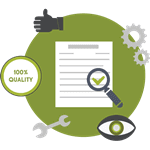 The process of conducting thorough and comprehensive research to write a lit review is pivotal. It serves as the foundation upon which researchers build their work, providing a solid framework of existing knowledge, ideas, and theories that inform and shape their own contributions. However, the integrity of this foundational element can sometimes be compromised by inaccuracies or inadequacies in the citations and references within Chapter 2. We offer specialized citation auditing services designed to meticulously examine and assess the citation accuracy, relevance, and consistency within the literature review of a research project. We offer a critical and discerning eye that can help researchers ensure that their citations are not only impeccably accurate but also thoroughly aligned with the research objectives and arguments they intend to put forth. In this fast-paced world of academia, where rigorous attention to detail is paramount, we provide researchers with a valuable resource. By entrusting the auditing of citations to our professionals, researchers can save precious time and ensure that their literature review is a rock-solid pillar of scholarly excellence. The significance of our services, explore the benefits we offer, and shed light on how they contribute to the overall quality and credibility of research projects. We can guide you on the best way to audit citations in a lit review.
The process of conducting thorough and comprehensive research to write a lit review is pivotal. It serves as the foundation upon which researchers build their work, providing a solid framework of existing knowledge, ideas, and theories that inform and shape their own contributions. However, the integrity of this foundational element can sometimes be compromised by inaccuracies or inadequacies in the citations and references within Chapter 2. We offer specialized citation auditing services designed to meticulously examine and assess the citation accuracy, relevance, and consistency within the literature review of a research project. We offer a critical and discerning eye that can help researchers ensure that their citations are not only impeccably accurate but also thoroughly aligned with the research objectives and arguments they intend to put forth. In this fast-paced world of academia, where rigorous attention to detail is paramount, we provide researchers with a valuable resource. By entrusting the auditing of citations to our professionals, researchers can save precious time and ensure that their literature review is a rock-solid pillar of scholarly excellence. The significance of our services, explore the benefits we offer, and shed light on how they contribute to the overall quality and credibility of research projects. We can guide you on the best way to audit citations in a lit review.
The impact of inaccurate citations on research integrity in a lit review
Inaccurate citations in a lit review can have a profound impact on research integrity. Research integrity is built upon principles of honesty, transparency, and the responsible conduct of research. When citations are inaccurate, it undermines these principles in several ways:
- Misleading Information: Inaccurate citations can mislead readers by attributing claims or findings to sources that never made them. This misrepresentation can lead to a distorted understanding of the existing literature, ultimately compromising the validity of the research.
- Credibility Erosion: They can erode the credibility of both the researcher and the research itself. It suggests a lack of thoroughness, negligence, or even deliberate deception, all of which are detrimental to the researcher's reputation and the integrity of the field.
- Academic Plagiarism: Failing to properly attribute sources through accurate citations can cross the line into academic plagiarism, which is a serious ethical violation. Plagiarism undermines the trust and ethical standards within the academic community.
- Impact on Decision-Making: Research findings often inform policy decisions, clinical practices, and further research. Inaccurate citations can lead to flawed decision-making processes, potentially harming individuals, organizations, or society as a whole.
- Legal Consequences: In some cases, inaccurate citations can even lead to legal repercussions if copyright or intellectual property rights are violated through improper attribution.
How our Chapter 2 citations auditing help can benefit your research project
Our research project literature review citations auditing services can significantly benefit your research project in several key ways. We ensure that all citations and references in your research align with the highest standards of academic integrity and formatting. This eliminates the risk of plagiarism or citation errors, which could have severe consequences for your project's credibility and your academic or professional reputation. Our expert auditors meticulously cross-check your citations against your bibliography, ensuring that all sources cited in your paper are correctly documented. This enhances the reliability and accuracy of your research, making it easier for readers to verify your claims and follow your scholarly trail. Furthermore, our citation services can save you valuable time and effort by handling the laborious task of verifying and formatting citations, allowing you to focus on your research content. This streamlines the writing process and reduces the stress associated with bibliography management. Ultimately, by availing of our citation auditing help, you can enhance the overall quality of your research, maintain academic rigor, and present a polished, error-free manuscript that stands out in the academic or professional sphere.
Why audit citations in a research project Chapter II?
Auditing citations in Chapter II of a project is crucial in ensuring;
- Accuracy and Credibility: Auditing citations ensures that all the references cited are accurate and correctly attributed. This is essential for maintaining the credibility and academic integrity of your research.
- Plagiarism Control: Auditing helps you identify any instances of accidental or unintentional plagiarism. It ensures that you have properly paraphrased or quoted the original sources, giving credit where it's due.
- Quality Control: It allows you to assess the quality and relevance of your sources. Are you relying on reputable and up-to-date references? Are there any biased or questionable sources that need to be removed or supplemented with more reliable ones?
- Completeness: Auditing helps confirm that you've cited all the relevant sources that support your research. It ensures you haven't missed any pivotal studies or key contributors to the field.
- Consistency: Consistency in citation style is vital for readability and adherence to academic conventions. Auditing helps you confirm that you've consistently applied the chosen citation style throughout your chapter.
- Relevance: It helps you assess whether all the cited sources are directly related to your research objectives. Eliminating irrelevant citations improves the focus and coherence of your literature review.
- Updating: Periodic citation audits help you identify outdated sources that may need replacement with more recent studies to keep your research up-to-date.
 We shed light on the critical importance of maintaining accuracy and integrity in academic and professional literature. We have examined various aspects of our Chapter II citation auditing guidance, including their significance in academia, the challenges they address, and the benefits they offer to researchers, publishers, and institutions. This lit review has demonstrated that citation auditing services play a pivotal role in ensuring the credibility and reliability of scholarly publications. They aid in identifying and rectifying citation errors, plagiarism, and misattribution, thereby upholding the ethical standards of research. Moreover, these services contribute to the advancement of knowledge by facilitating a transparent and accountable academic environment. Furthermore, we highlight the growing demand for auditing assistance in the digital age, where vast amounts of information are easily accessible but also prone to manipulation and misuse. As researchers and institutions continue to grapple with issues related to academic integrity, we emerge as a valuable tool in promoting ethical research practices. It is evident that the field of auditing services is poised for further development and innovation. As we move forward, researchers, publishers, and institutions must recognize the pivotal role that we play in upholding the quality and trustworthiness of scholarly work. Embracing and integrating our services into the research process will undoubtedly contribute to the continued growth and credibility of the academic and professional community.
We shed light on the critical importance of maintaining accuracy and integrity in academic and professional literature. We have examined various aspects of our Chapter II citation auditing guidance, including their significance in academia, the challenges they address, and the benefits they offer to researchers, publishers, and institutions. This lit review has demonstrated that citation auditing services play a pivotal role in ensuring the credibility and reliability of scholarly publications. They aid in identifying and rectifying citation errors, plagiarism, and misattribution, thereby upholding the ethical standards of research. Moreover, these services contribute to the advancement of knowledge by facilitating a transparent and accountable academic environment. Furthermore, we highlight the growing demand for auditing assistance in the digital age, where vast amounts of information are easily accessible but also prone to manipulation and misuse. As researchers and institutions continue to grapple with issues related to academic integrity, we emerge as a valuable tool in promoting ethical research practices. It is evident that the field of auditing services is poised for further development and innovation. As we move forward, researchers, publishers, and institutions must recognize the pivotal role that we play in upholding the quality and trustworthiness of scholarly work. Embracing and integrating our services into the research process will undoubtedly contribute to the continued growth and credibility of the academic and professional community.
How to Audit Citations in Chapter Two of a Research Assignment
 In academic research and scholarly writing, citations play a pivotal role in substantiating claims, providing credibility, and acknowledging the intellectual contributions of others. Lit review is a critical juncture where the accuracy and quality of citations can significantly impact the overall integrity of the study. It is in this chapter that a researcher navigates through a sea of previously published works to establish the theoretical and empirical foundation for their own investigation. As such, citation auditing in Chapter Two is a task of paramount importance. We offer quality help with reviewing citations in a lit review, as it is a commitment to the rigorous standards of academic inquiry. Auditing citations involves a meticulous examination of the sources cited within the literature review, ensuring they are relevant, reliable, and correctly attributed. This process demands an in-depth understanding of citation styles, reference formats, and an acute eye for detail. We probe into the art and science of auditing citations in an assignment. We will explore the key elements of a comprehensive citation audit, the tools and techniques available for this purpose, and the significance of this process in maintaining the academic integrity and scholarly rigor that underpin any credible research endeavor. Whether you are a student striving for excellence in your academic pursuits or a seasoned researcher committed to contributing valuable insights to your field, the skill of examining citations is an invaluable asset in your scholarly toolkit.
In academic research and scholarly writing, citations play a pivotal role in substantiating claims, providing credibility, and acknowledging the intellectual contributions of others. Lit review is a critical juncture where the accuracy and quality of citations can significantly impact the overall integrity of the study. It is in this chapter that a researcher navigates through a sea of previously published works to establish the theoretical and empirical foundation for their own investigation. As such, citation auditing in Chapter Two is a task of paramount importance. We offer quality help with reviewing citations in a lit review, as it is a commitment to the rigorous standards of academic inquiry. Auditing citations involves a meticulous examination of the sources cited within the literature review, ensuring they are relevant, reliable, and correctly attributed. This process demands an in-depth understanding of citation styles, reference formats, and an acute eye for detail. We probe into the art and science of auditing citations in an assignment. We will explore the key elements of a comprehensive citation audit, the tools and techniques available for this purpose, and the significance of this process in maintaining the academic integrity and scholarly rigor that underpin any credible research endeavor. Whether you are a student striving for excellence in your academic pursuits or a seasoned researcher committed to contributing valuable insights to your field, the skill of examining citations is an invaluable asset in your scholarly toolkit.
What makes citations suitable for auditing in Chapter II?
In Chapter II of a project, citations play a crucial role in providing the foundation and context for the study. To make citations suitable for auditing in this section, several key attributes should be considered:
- Relevance: Citations should be directly related to the research topic and objectives discussed in Chapter II. Ensure that each citation contributes to the understanding of the research problem or supports the theoretical framework.
- Currency: Use recent and up-to-date sources to demonstrate awareness of the latest developments in the field. Outdated references may not accurately represent the current state of knowledge.
- Diversity: Incorporate a variety of sources, including peer-reviewed journal articles, books, conference papers, and reputable reports, to ensure a comprehensive and balanced perspective on the topic.
- Credibility: Only cite sources from reputable and reliable authors, institutions, and publishers. Avoid using sources with potential bias, questionable methodology, or lack of peer review.
- Clarity: Provide clear and accurate citations, following a consistent citation style (e.g., APA, MLA, Chicago) to make it easy for auditors to verify your sources.
- Breadth and Depth: Balance between foundational texts and recent contributions to show a thorough understanding of the topic's historical context and recent advancements.
- Critical Evaluation: Analyze and critique the cited literature to highlight gaps, contradictions, or debates within the field, demonstrating your ability to synthesize and critically assess existing knowledge.
- Organization: Arrange citations logically within the text, connecting them to the research narrative to ensure a cohesive and coherent flow.
- Proper Attribution: Ensure that all ideas, data, and concepts taken from cited sources are appropriately attributed to their original authors, avoiding plagiarism.
- Consistency: Maintain a consistent citation format and style throughout Chapter II, following the guidelines of your chosen citation style.
A step-by-step guide to auditing citations in your project Chapter 2
Assessing citations is a crucial step to ensure the accuracy, credibility, and relevance of your research. Here's a how to audit citations in chapter two of a research assignment:
- Compile a Citation List: Begin by creating a comprehensive list of all the citations used in Chapter 2. This should include both in-text citations and references in the bibliography.
- Verify Source Authenticity: Check the authenticity of each source. Ensure they are from reputable publishers, academic journals, or credible websites. Eliminate any sources from unreliable or biased platforms.
- Cross-Check Information: Verify that the information cited accurately represents the source. Ensure that quotes, statistics, and data are correctly attributed and contextualized.
- Check Citation Style: Ensure that all citations adhere to the required citation style (e.g., APA, MLA, Chicago). Consistency in formatting is vital for academic integrity.
- Evaluate Source Relevance: Assess whether each citation is directly relevant to your research objectives and supports the arguments made in Chapter 2. Remove any citations that don't contribute to your thesis.
- Check for Outdated Sources: Ensure that the sources cited are up-to-date and pertinent to your topic. Replace outdated sources with more current ones if necessary.
- Address Plagiarism: Run plagiarism checks on your Chapter 2 content to identify any unintentional plagiarism. Correct or properly attribute borrowed ideas.
- Review Citation Clarity: Make sure that each citation is clear and understandable to your readers. If a citation is confusing or lacks context, revise it.
- Evaluate Citations for Bias: Be aware of potential biases in your sources. If your research includes diverse perspectives, ensure that citations reflect a balanced view.
- Document Changes: Keep a record of any changes made to citations, including additions, deletions, or alterations. Maintain transparency in your auditing process.
- Do Final Proofreading: After auditing, proofread Chapter 2 for consistency and citation accuracy one final time.
 Inspecting references is a crucial task that contributes significantly to the overall credibility and quality of your academic work. Properly conducted citation audits ensure that your research is built on a solid foundation of accurate and reliable sources, thereby strengthening the validity of your arguments and conclusions. To effectively review citations in Chapter 2, follow a systematic approach. Begin by verifying the accuracy of each citation against the original source. Ensure that the publication details, such as author names, publication dates, titles, and page numbers, are correctly referenced. Additionally, assess the relevance of each citation to your research objectives and themes, eliminating any that do not directly contribute to your study. Furthermore, pay attention to the formatting and citation style guidelines required by your institution or academic discipline. Consistency in formatting demonstrates your attention to detail and adherence to scholarly conventions. Remember that thorough citation assessment is not just about identifying errors but also about enhancing the depth and breadth of your literature review. It provides an opportunity to identify gaps in your research and discover additional sources that may strengthen your argument. Basically, conducting a meticulous citation check in Chapter II is an essential step toward producing a well-founded, credible, and academically sound research assignment. It not only ensures that your work is free from errors but also enhances the overall rigor and impact of your research.
Inspecting references is a crucial task that contributes significantly to the overall credibility and quality of your academic work. Properly conducted citation audits ensure that your research is built on a solid foundation of accurate and reliable sources, thereby strengthening the validity of your arguments and conclusions. To effectively review citations in Chapter 2, follow a systematic approach. Begin by verifying the accuracy of each citation against the original source. Ensure that the publication details, such as author names, publication dates, titles, and page numbers, are correctly referenced. Additionally, assess the relevance of each citation to your research objectives and themes, eliminating any that do not directly contribute to your study. Furthermore, pay attention to the formatting and citation style guidelines required by your institution or academic discipline. Consistency in formatting demonstrates your attention to detail and adherence to scholarly conventions. Remember that thorough citation assessment is not just about identifying errors but also about enhancing the depth and breadth of your literature review. It provides an opportunity to identify gaps in your research and discover additional sources that may strengthen your argument. Basically, conducting a meticulous citation check in Chapter II is an essential step toward producing a well-founded, credible, and academically sound research assignment. It not only ensures that your work is free from errors but also enhances the overall rigor and impact of your research.











 Does your work Require Rewriting Help?
Does your work Require Rewriting Help?